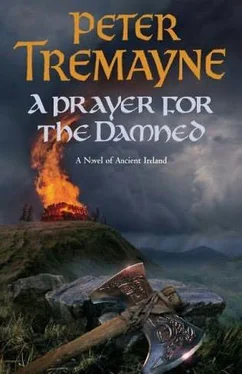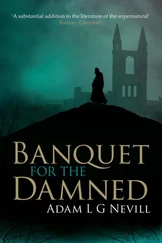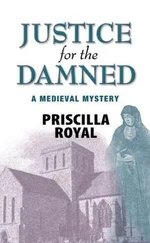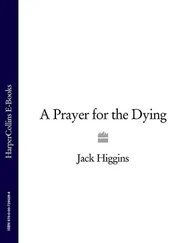Peter Tremayne - A Prayer for the Damned
Здесь есть возможность читать онлайн «Peter Tremayne - A Prayer for the Damned» весь текст электронной книги совершенно бесплатно (целиком полную версию без сокращений). В некоторых случаях можно слушать аудио, скачать через торрент в формате fb2 и присутствует краткое содержание. Жанр: Исторический детектив, на английском языке. Описание произведения, (предисловие) а так же отзывы посетителей доступны на портале библиотеки ЛибКат.
- Название:A Prayer for the Damned
- Автор:
- Жанр:
- Год:неизвестен
- ISBN:нет данных
- Рейтинг книги:4 / 5. Голосов: 1
-
Избранное:Добавить в избранное
- Отзывы:
-
Ваша оценка:
- 80
- 1
- 2
- 3
- 4
- 5
A Prayer for the Damned: краткое содержание, описание и аннотация
Предлагаем к чтению аннотацию, описание, краткое содержание или предисловие (зависит от того, что написал сам автор книги «A Prayer for the Damned»). Если вы не нашли необходимую информацию о книге — напишите в комментариях, мы постараемся отыскать её.
A Prayer for the Damned — читать онлайн бесплатно полную книгу (весь текст) целиком
Ниже представлен текст книги, разбитый по страницам. Система сохранения места последней прочитанной страницы, позволяет с удобством читать онлайн бесплатно книгу «A Prayer for the Damned», без необходимости каждый раз заново искать на чём Вы остановились. Поставьте закладку, и сможете в любой момент перейти на страницу, на которой закончили чтение.
Интервал:
Закладка:
Eadulf knew this well enough.
‘The difference is that your civil laws provide for this and counter any impropriety by the fact that the abbey is not the sole owner of the land it covers,’ he pointed out. ‘The land is granted to the abbey by the chieftain or king, and the local clan also elects a lay officer to ensure that the land and property are not alienated. This is not so in other cultures where the abbot’s family can seize the property and make it personal to their families. This is what the curia , the papal court in Rome, is concerned with.’
Abbot Ségdae shook his head with an exasperated sigh. ‘I have no understanding of this.’
Colgú shared his perplexity. ‘No more do I, yet I understand that Eadulf is saying that the concerns of Rome have no relevance in this land. What it comes down to is this, and correct me if I am wrong: Abbot Ultán’s views are not supported by any law or rule that must be obeyed by all members of the Faith. Is that so?’
‘That is so,’ agreed Baithen.
‘Then, should Abbot Ultán start protesting, he must be told in front of the assembly that his personal views, no matter who shares them, are not law in this land. He must desist from voicing his protest until some council of the church, which has jurisdiction to do so, makes it into a binding law on members of the Faith. Only when such an ecclesiastical rule is incorporated into our law system can such protests be validly made.’
Brehon Baithen smiled in satisfaction.
‘An excellent summary of the situation,’ he applauded.
Colgú glanced at his sister with a smile. ‘Do you approve of this course of action?’
Fidelma’s expression was solemn.
‘It is the only course,’ she agreed almost reluctantly. ‘I would rather that Abbot Ultán would not raise the matter in the first place, but. .’ She ended with a shrug.
‘Perhaps. .’ began Eadulf, and then paused.
‘Perhaps?’ prompted Colgú immediately, turning to him.
‘I wondered if Abbot Ultán could be informed of the decision in this matter tonight, before the ceremony starts tomorrow, in an effort to persuade him to hold his peace?’
‘A good suggestion,’ agreed the king. ‘Surely that could do no harm?’ Colgú glanced round the company and his eyes came to rest on Abbot Ségdae. ‘But who would speak with him? As senior churchman. .?’
Abbot Ségdae shook his head immediately. ‘Not I. Our discussion at Imleach has made Ultán view me as his prime antagonist and I doubt whether he would listen to a word I said.’
‘Advising on law and procedure is my role,’ Brehon Baithen interposed. ‘I will go to his chambers and have a word with this fiery prelate from the north. Perhaps the commander of the guard will attend me as the person who will have to enforce order in case our northern friend becomes too inflammatory in his protests?’
Caol smiled broadly and signified his agreement.
‘Then we are satisfied as to this course?’ asked Colgú, glancing round. There was a murmuring of assent and the king sighed and sat back. ‘Remain with me, Fidelma, and you also, Eadulf.’
He waited until Abbot Ségdae, Brehon Baithen and Caol had departed, and then he rose to pour three goblets of wine, handing one each to his sister and Eadulf before taking the third for himself.
‘To a peaceful day tomorrow,’ he toasted. They drank dutifully.
There was a pause and then Eadulf commented: ‘Abbot Ultán apart, it should be anything but peaceful, judging from the distinguished visitors that have flocked to Cashel and the festival that is being prepared in the town. All this for what is no more than a confirmation of our wedding vows. We have already been married a year.’
Colgú laughed with good nature. ‘You may have lived as ben charrthach and fer comtha for a year and a day but this is the significant ceremony whereby my sister becomes your true cétmuintir . It is an important step.’
‘Well, I had not expected a ceremony so elaborate as to bring the High King and his Chief Brehon here, not to mention the provincial kings, nobles and envoys from other lands,’ Eadulf said, with a shake of his head.
Fidelma had been unusually subdued all evening and now she stirred.
‘My brother will tell you why they are here,’ she said softly.
Colgú smiled encouragingly at Eadulf. ‘Forgive me. Sometimes I forget that you have not learnt everything there is to know about our family and our kingdom. The attendance of the High King and the others is out of respect to our family, the Eóghanacht. Our ancients tell us that when our ancestors first came to this island, so long ago that time has no meaning, two great warriors named Eibhear Fionn and Ererrion led them. They were brothers, the sons of Golamh, the progenitor of our people who died on the voyage here. Having fought the ancient gods and goddesses who dwelt here, and driven them underground into the sídhe , the hills, Eremon was given the northern half of the island to rule while Eibhear Fionn was given the southern half. From Eibhear Fionn are descended the Eóghanacht, our family, while from Eremon are descended the Uí Néill, which is the family of the current High King Sechnassach. Only our two families — the descendants of Eremon and Eibhear Fionn — are allowed to contest for the High Kingship. We sing the praises of twenty-four of the Eóghanacht who have sat in the seat of the High King until the days of Duach Donn Dalta Deagha, who was the last of our family to hold that office. The point is that the kingdom of Muman is the largest in this island and its kings are second to none, not even to the High King, although we pay homage to the concept of his office. It is out of respect for our ancestry, our traditions of kingship and our current strength in this land, that the High King comes to visit on the occasion of my sister’s wedding day. Likewise, that is why the other kings and nobles come to pay their respects at Cashel.’ He paused, and then his serious expression dissolved into a mischievous grin that marked his relationship to Fidelma, for Eadulf had seen that same grin on her features many times. ‘But I would like to think they also come out of respect for my sister as well, because her reputation as a dálaigh , an advocate of our law courts, is known in all the five kingdoms.’
Fidelma frowned and glanced quickly at Eadulf.
‘A reputation that is inseparably linked to that of Eadulf, without whom many a riddle would have remained unsolved,’ she added quickly.
‘What. .?’ Colgú seemed puzzled for the moment before he realised his implied offence. ‘Of course, of course. It is a shame that none of your Saxon kinsmen will be attending, although I hear some compatriots of yours — exiled religious — seek to settle in this kingdom and will be present. I understand that Cerball, the bard, has spoken to you so that he might compose a forsundud , a praise-poem, about your own ancestry. A wedding is not seemly unless the genealogy of both parties can be recited before the company.’
Eadulf did not reply. He could not boast that he knew more than three or so generations of his family. That was nothing compared to the Eóghanacht who boasted fifty-nine generations between Colgú and Eibhear Fionn son of Golamh. In spite of Brother Conchobhar’s assurances, an hereditary gerefa or magistrate of his people was hardly the equal to an Eóghanacht princess. Not for the first time did Eadulf experience a feeling of insecurity. He was very much a stranger in a strange land.
Colgú seemed to sense the air of tension that caused both Fidelma and Eadulf to fall quiet.
‘How is little Alchú?’ he asked, changing the subject.
‘Your nephew is well,’ answered Fidelma brightly. ‘Muirgen, our nurse, has been a godsend. I have no fears of leaving the child with her and her husband Nessán when my duty as a lawyer bids me spend time away.’
Читать дальшеИнтервал:
Закладка:
Похожие книги на «A Prayer for the Damned»
Представляем Вашему вниманию похожие книги на «A Prayer for the Damned» списком для выбора. Мы отобрали схожую по названию и смыслу литературу в надежде предоставить читателям больше вариантов отыскать новые, интересные, ещё непрочитанные произведения.
Обсуждение, отзывы о книге «A Prayer for the Damned» и просто собственные мнения читателей. Оставьте ваши комментарии, напишите, что Вы думаете о произведении, его смысле или главных героях. Укажите что конкретно понравилось, а что нет, и почему Вы так считаете.












